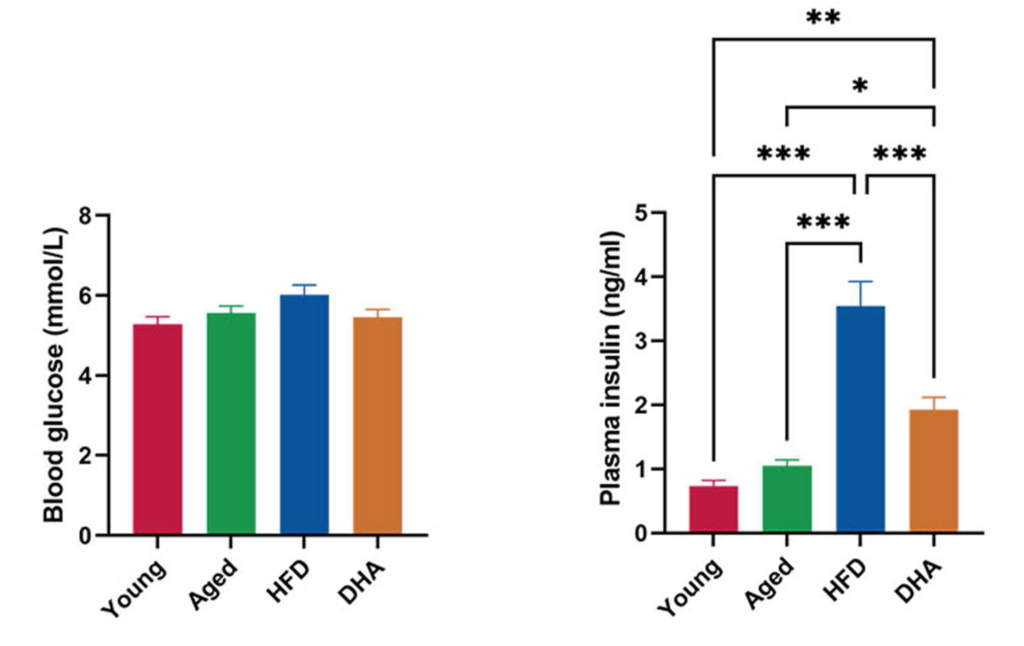Eat Your Way to a Sharper Mind: Study Shows Omega-3 DHA Can Reverse Brain Defects from Junk Food
DHA supplementation improves the memory of aged rats fed a high-fat diet while restoring insulin levels and reducing primary drivers of aging — inflammation and oxidative stress.
Highlights:
- Aged rats fed a high-fat diet (HFD) show deficits in learning and memory that are improved by DHA.
- Brain insulin resistance — a prerequisite to diabetes — is reduced by DHA.
- DHA reduces brain oxidative stress and inflammation.
While delicious, a lifetime of consuming an American-style diet, consisting of high-fat and high-sugar foods leads to age-related diseases like type 2 diabetes, fatty liver disease, cardiovascular disease, and cancer. Furthermore, such a diet combined with aging facilitates the development of age-related cognitive decline.
Now, researchers from the Chinese Academy of Agricultural Sciences may have found a way to counter the cognitive deficits triggered by aging and a HFD. As published in the Journal of Advanced Research, Xu and colleagues show that DHA mitigates cognitive impairment, brain insulin resistance, inflammation, and oxidative stress in aged rats fed a HFD.
“Our data demonstrate that DHA improves the cognitive function of aged rats on an HFD by facilitating hippocampal insulin signaling,” said the authors of the study.
DHA Counters High-Fat Diet-Induced Cognitive Impairment
DHA (docosahexaenoic acid) is the most abundant omega-3 fatty acid in the brain, important for cognitive ability. Therefore, Xu and colleagues tested whether feeding DHA to aged rats fed a HFD could improve cognition. By implementing the Morris water maze test — the most commonly used cognitive test for mice — it was found that DHA improved learning and memory, suggesting that DHA counters HFD-induced cognitive impairment.

(Xu et al., 2023 | J. Adv. Res.) DHA Counters American-Style Diet-Induced Cognitive Impairment. Compared to untreated aged rats fed a high-fat diet (blue, HFD), HFD-fed aged rats treated with DHA (orange, DHA) spent more time in the target quadrant of the Morris water maze, suggesting improved learning and memory.
When our neurons stop responding to insulin — insulin resistance — they are less able to uptake glucose and generate energy, leading to learning and memory deficits. To assess insulin resistance, Xu and colleagues measured blood glucose and plasma insulin levels.
While blood glucose levels were normal, the level of insulin needed to maintain this was 4-fold higher, suggesting insulin resistance. However, DHA greatly reduced plasma insulin levels, suggesting improvements in insulin sensitivity.

(Xu et al., 2023 | J. Adv. Res.) DHA Counters American-Style Diet-Induced Insulin Resistance. Untreated aged rats fed a high-fat diet (blue, HFD) and HFD-fed aged rats treated with DHA (orange, DHA) have normal blood glucose levels (left). However, HFD-fed aged rats have much higher plasma insulin levels (right), suggesting insulin resistance. DHA reduces insulin levels, suggesting a reduction in insulin resistance.
Brain insulin resistance is driven by inflammation and oxidative stress. To this end, Xu and colleagues measured TNF-⍺ — a pro-inflammatory protein — and — glutathione (GSH) — an antioxidant that counters oxidative stress.
From the hippocampus of untreated HFD-fed aged mice, the researchers found that TNF-⍺ was elevated and GSH was reduced, suggesting increased inflammation and oxidative stress. However, DHA treatment reduced TNF-⍺ and increased the oxidative stress neutralizer GSH. These findings suggest that DHA reduces HFD-induced brain inflammation and oxidative stress.

(Xu et al., 2023 | J. Adv. Res.) DHA Counters American-Style Diet-Induced Brain Aging. Compared to untreated aged rats fed a high-fat diet (blue, HFD), HFD-fed aged rats treated with DHA (orange, DHA) have higher levels of inflammation (TNF-⍺) and lowered antioxidant defenses (GSH), suggesting that DHA counters inflammation and oxidative stress.
Overall, the findings of Xu and colleagues suggest that DHA omega-3 fatty acid supplementation counters HFD-induced cognitive impairment by improving insulin sensitivity and reducing brain inflammation and oxidative stress. The authors state:
“Our observations provide a possible understanding of maintaining cognitive function of DHA supplementation, and future studies are warranted to better understand the mechanisms in models that more closely match clinical application.”
Implications for Alzheimer’s Dementia (AD)
In humans, there is a strong association between AD and type 2 diabetes — characterized by insulin resistance and high blood glucose. Therefore, it is possible that an American-style diet triggers AD. Furthermore, a previous study showed that DHA counters cognitive impairment in aged rats fed a high-refined carb diet, completing the American-style diet picture.
DHA can be found in supplement form but is also rich in foods like fatty fish, including salmon. Therefore, eating a diet low in saturated fats and refined carbohydrates but high in nutrients like DHA could potentially prevent or slow brain aging.
Model: Aged (18-month-old) female Sprague-Dawley rats fed a high-fat diet (45% of calories from fat)
Dose: 1% DHA in food for 10 months

